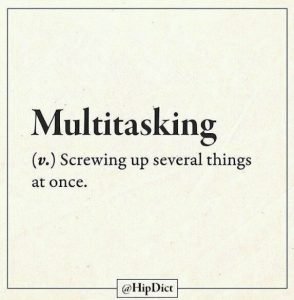I know that this statement sounds like a mouthful. Before we answer that statement, we must first define the terms:
Efficient– Being able to perform a task quickly without consuming too much resource (Eg, time, money and etc).
Effective– Being able to do what is important.
In your everyday work, just look around and ask, “Am I concentrating on doing things Efficiently or Effectively?”
I dare say that most people are concerned with being efficient, but rarely ask the bigger question, whether what they do first of all, is what really matters. We are usually concerned with how to do things faster, or even creating Standard Operating Procedures (SOP)s to rinse and repeat the whole process. While this is good, it fails to answer what really manners at the end of the day?
In my training with managers and executives, I often ask them what are the top 3 important areas of their work they need to focus on and how much time of the week actually gets devoted to it. The answer is usually astonishing! They end up doing so many things that demand their attention that they fail to do what really matters in their job (Efficient, but not Effective). It is important to know what really matters and start from there, rather than rush in and do things fast.
It is only when we realise what being effective means to us and our boss (yes, bosses usually seem to have different standards of what effectiveness mean), then can we proceed to be efficient in what we are doing. The worst thing to do is to be efficient in what we do, only to find out that it does not really matter in the work environment.
Let me give you an example.
Lisa was hired as a personal assistant to Tom. What Tom wanted Lisa to do was to make him more effective by helping him with the admin work. Lisa was happy at first, but gradually she was slowly drawn into helping him do more than admin work. Daily tasks included, helping him to cold call, gather leads, following up with his clients, chasing payments and preparing his power point presentations and etc. She covered almost every aspect of his work. This made Lisa more tired, stressed and over-worked, because she was not working from her strengths. She hated sales and did not like making cold calls.
In the end, she quitted her job and was frustrated in doing everything. The interesting thing was that Tom was also unhappy with Lisa’s performance. He mentioned that “She could not perform.”
A better approach for Tom is to give her a specific Job Description (JD) in HALF A PAGE. Once she is clear, Tom can approach her to do other things that are not within the JD. Only if she can finish the main tasks listed out in the JD, she can proceed to do the other things. Tom mentions that at any point of time Lisa can refuse to do the additional things, simply because it affects her focus in fulfilling her JD. This creates a better WIN-WIN situation, because Lisa is not overwhelmed and able to work effectively, while Tom manages his expectations better. Being Effective sometimes also means refusing to do something if it diverts our attention.
Conclusion
What we do is always more important than How we do things.
Being Efficient does not make us effective. Efficiency is only useful if it is applied to the right things. Perhaps after all this, we can be Efficiently Effective?
You can also engage me to speak on this topic for your staff.
If you like this article, please subscribe to our blog by getting the Free Report on “7 Deadly Secrets to creating a Dynamic and Cohesive Team”. If you have comments, I would love to hear them. Please post them below.







